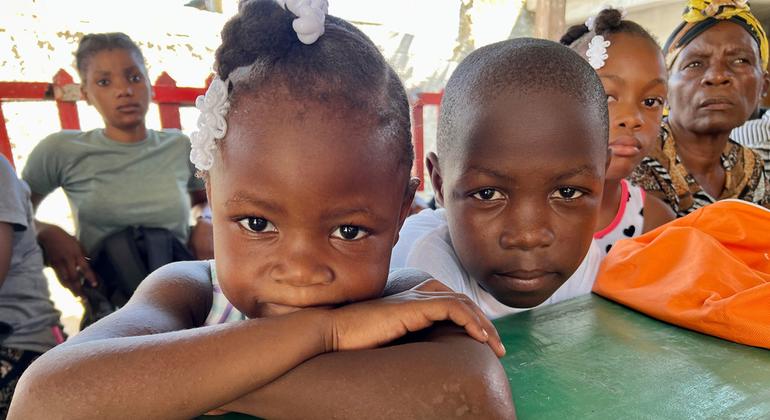Escalating armed violence in Haiti has triggered a profound humanitarian crisis, the UN Children’s Fund, UNICEF, warned on Wednesday.
At least 170,000 children are now displaced – double the number from last year – amid a surge in gang-led killings and kidnappings, sexual violence and a severe food crisis.
“In Haiti, children and families are enduring relentless waves of brutal violence, with each day bringing new horrors, the loss of loved ones, homes being destroyed by fire, and an ever-present shadow of fear,” said Bruno Maes, UNICEF Representative in the country, who visited three displacement sites in the capital Port-au-Prince.
Clashes in the capital
Latest UNICEF data revealed that nearly 314,000 people, roughly half of them children, have been uprooted across Haiti, mainly in the capital and the Artibonite department.
In less than two weeks, nearly 2,500 people, most of them women and children, have been newly displaced following clashes in the Solino and Gabelliste areas in the capital.
UNICEF estimates that three million children across Haiti will require humanitarian aid this year. The agency is seeking $221.7 million to respond to needs.
Torture used to obtain evidence in Hong Kong trial: UN expert
A UN-appointed independent human rights expert has called for China to address torture claims in connection with the trial of Hong Kong pro-democracy media mogul Jimmy Lai.
Special Rapporteur Alice Edwards warned on Wednesday that evidence obtained through torture must not be admissible, urging authorities to investigate allegations that evidence from a key prosecution witness had been obtained through torture.
“The absolute prohibition of reliance on evidence obtained as a result of torture or other ill-treatment in any proceedings is a fundamental protection,” she said.
Mr. Lai was arrested in August 2020 and charged with sedition and foreign collusion under a new security law following tweets, interviews and articles published in his newspaper, the Apple Daily.
He was convicted of unauthorized assembly in 2021 for his participation in previous protests and sentenced to 17 months in prison. He was sentenced to an additional five years and nine months for fraud in October 2022.
In a statement last week calling for his immediate release, Ms. Edwards and other rights experts expressed alarm at the “multiple and serious violations” of Mr. Lai’s right to freedom of assembly and a fair trial.
They also highlighted with concern “the denial of access to a lawyer” of Mr. Lai’s choosing “and the handpicking of judges by the authorities”.
The rights experts also reiterated concerns that the national security law used to convict Mr. Lai and 47 other pro-democracy activists last year is not in line with international legal obligations and should be repealed.
Special Rapporteurs and independent experts are appointed by the UN Human Rights Council in Geneva to monitor and report on specific country situations or thematic issues. They are not UN staff and are not paid for their work.

Sudanese refugee Triza, 32, sits in her shelter at the Kurmuk transit centre in the Benishangul-Gumuz region of northwestern Ethiopia.
Support millions fleeing war-torn Sudan: UN refugee chief
The UN High Commissioner for Refugees, Filippo Grandi, has concluded a three-day visit to Ethiopia, where he called for more support for the nearly eight million people fleeing the war in Sudan.
More than 100,000 alone have crossed into Ethiopia since conflict erupted last April between the Sudanese army and a powerful rival military force, the RSF, according to the UN refugee agency, UNHCR.
This includes close to 47,000 people who are already refugees and asylum-seekers, in addition to the 50,000 Sudanese refugees already in the country.
‘Heartbreaking stories’
Mr. Grandi travelled to the town of Assosa, where he met some of the over 20,000 refugees and asylum-seekers from Sudan currently hosted at the Kurmuk transit centre.
“I heard stories of heartbreaking loss of family, friends, homes and livelihoods, yet in the midst of this despair, I also saw refugees’ determination to move forward, if given the support and opportunity,” he said.
He commended the Government and local communities for allocating land and welcoming the arrivals despite their own challenges, including hosting a large refugee population.
Ethiopia is one of six countries neighbouring Sudan that continue to receive thousands of people escaping the conflict.
It also hosts one of the largest refugee and internally displaced populations globally and is the third largest refugee-hosting country in Africa.
Nearly one million refugees – mainly from South Sudan, Somalia, Eritrea, and Sudan – have found shelter in Ethiopia, while an estimated 3.5 million Ethiopians are internally displaced.
UNHCR’s programmes in Ethiopia were less than half-funded last year, receiving only 36 per cent of the $431 million requested. The agency is seeking $426 million to support operations this year.



